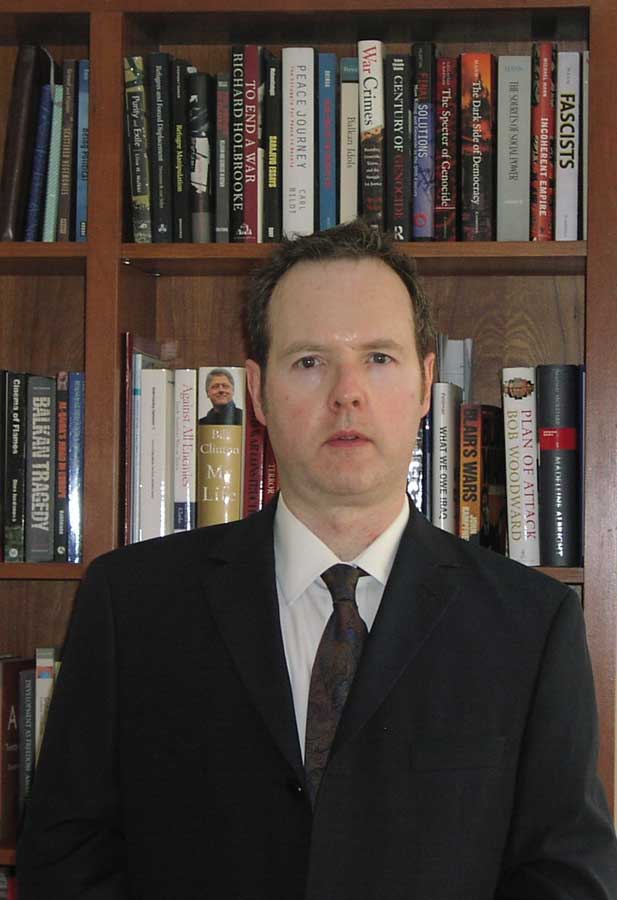Gerard Toal honored with geography career award

Gerard Toal, professor and director of Virginia Tech's Government and International Affairs (GIA) program in the National Capital Region, has been honored with a career award in the field of geography by the Political Geography Specialty Group and Elsevier, publisher of the journal, Political Geography.
The award involves the recipient presenting the Political Geography Plenary Lecture at the Association of American Geographers annual meeting, which Toal did recently in Boston. The topic of his lecture was “Indiscriminate Geo-Graphing: On (Counter) Terrorism and Beslan.” Toal received a plaque to mark the lecture and award. Toal’s lecture and three responses to it (also presented at the conference) will run as feature articles in a future issue of Political Geography.
The focus of Toal’s hour long lecture was the horrific terrorist attack at School Number One in Beslan, Russia, in September 2004, which took the lives of 334 people, 180 of whom were schoolchildren. What was the reason for the attack (which immediately became a global media event) and who was involved?
“Terrorism does not allow innocence; it collectivizes, totalizes and condemns through violence. This is a function of its extreme reduction of politics to pure war, to a battle between unambiguous perpetrators and victims which saturates all social space. Everywhere is a battlefield, everyone aligned with either perpetrators or victims,” said Toal. “Terrorists claim to act on behalf of the victimized, to heroically strike back against an overarching ‘state terrorism’ that is rarely named as such. In their minds, they are actually counter-terrorists fighting a more insidious terrorism.”
Toal’s paper examines the indiscriminate geo-graphing circulating around Beslan. Approaching the attack on School Number One from a series of perspectives – historical, terrorist-centered, Kremlin-centered, and North Ossetia-centered – it documents the efforts by different actors in the drama to make sense of the painful event by creating spaces of blame. The paper argues that the North Caucasus has a long history of indiscriminate and undifferentiating geo-graphing practices which made possible a variety of terrorisms in the region and it documents how this persists today with the variety of readings of the Beslan attack that have emerged in its wake.
“Beslan is not an event with a singular meaning or geography. It was neither an act of ‘international terrorism’ nor an act that was purely local or regional,” Toal said. “It is a deeply emotive event, one whose contested meaning reveals much about the complexity of the North Caucasus and about power and identity in contemporary Russia.”
The research Toal presented in his lecture was supported by a grant from the Human and Social Dynamics Initiative of the United States National Science Foundation and was conducted with colleagues John O’Loughlin, Institute of Behavioral Science and Department of Geography, University of Colorado, Boulder, and Vladimir Kolossov, Institute of Geography of the Russian Academy of Sciences, Moscow. The three have been collaborating on research projects on Russian geopolitical culture since 2001.
In August 2007 the team went to the site of the School Number One attack in Beslan and conducted fieldwork in North Ossetia. One issue they sought to determine was how different national communities in the region understood and explained the reasons for the Beslan attack. They organized a social science survey of political attitudes across the North Caucasus region in 2005, one year after the Beslan attack. Two questions were explicitly about how people understood Beslan.
The findings, which Toal presented during his lecture, include
- Strikingly low numbers of people believed that the fight of Chechens for independence was the explanation for Beslan. “This is a remarkable result considering the fact that the attack was planned by a well known Chechen terrorist, featured a number of Chechen terrorists including the only survivor, and had as its declared demand the withdrawal of federal troops from Chechnya,” says Toal.
- Only a small percentage of respondents interpreted the event in Islamo-territorial terms, as part of a drive to establish an Islamic caliphate in the region. Interestingly, the percentage subscribing to this reading is very consistent across all ethnic groups (between 13 and 14 percent).
- Very few accepted that Beslan was the result of the harsh policies of the Russian military in the North Caucasus. Studies of suicide terrorists, however, reveal many suffer from post-traumatic stress disorder due to the death of a close family member at the hands of security forces.
- Two explanations for Beslan were equally popular among the sample of residents in the North Caucasus: the desire of the terrorists to ignite the Ingush-Ossetian conflict (23.5 percent) and international terrorism (23.6 percent). According to Toal, both these explanatory storylines were championed by the Kremlin and official media outlets “so it is hardly surprising that they were both seen as persuasive.” These were the approved television explanations.
- A certain portion of respondents found ‘organized criminality’ a satisfactory explanation, 12.45 percent in total though the figure was low among Ossetians (only 3 percent) and much higher among Russians, at 15.5 percent, which is higher than the number of Russians choosing the Islamo-territorial explanation.
Toal said that Beslan today appears to have an excess of representational meaning. For some, it is a demonstration of the threat that is Islamic terrorism, for others of the conspiracy against Russia as a great power, and for others of local antagonisms, and yet for others another milestone on the road to modern czarism in Russia. He quoted Nigel Thrift who, in his essay on extreme violence, wrote: “It is necessary to have the courage of one’s own ambivalence.”
“This is probably the best response to Beslan,” Toal said as he concluded his lecture, “a refusal to give into global moralizing, and a vigilance against the indiscriminate blaming which too often launches new terrorisms in the name of civilization.”




